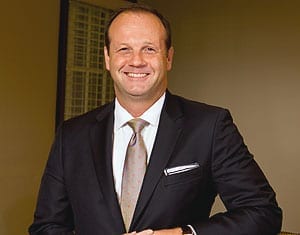
Skip Sugarman says his clients won right to control use of their software.
Photo by John Disney/Daily Report
Gwinnett Plaintiffs happy with their win despite a long and expensive battle with their business partners
A three-year battle between owners of a Gwinnett County software company concluded last month with the payment of $800,000 in attorneys’ fees to the side that made the best case to the arbitrator. But the whole episode cost all the parties together well in excess of $3.5 million in legal expenses, plus about $150,000 in arbitration costs, according to the attorneys.
“I point this case out as an example when clients say arbitration is cheaper and faster,” said F. Skip Sugarman of Bloom Sugarman Everett. His clients, Gwinnett County businessmen Kenneth Shumard and Kenneth Shumard Jr., won the $800,000 attorneys’ fee award. The Shumards were pleased because they won on the issue that started the dispute in 2010—the right to control the use of medical billing software that helps doctors get paid for their services, particularly when insurance claims are delayed or denied. The software is a valuable product that could be worth tens of millions in sales, Sugarman said. The Shumards didn’t ask for any monetary damages in the dispute, which only involved control over the software.
The victory came at a high price. The Shumards own a software company with a group of partners based in St. Louis. In addition to the $800,000 the Shumards collected from their St. Louis partners, they also won an award of $400,000 in attorneys’ fees from their own company. But they can’t collect the $400,000 because their company doesn’t have the cash to pay them, Everett said.
Even after all the fighting, the Shumards and the St. Louis group remain partners. “It’s like a messy divorce, without the divorce,” Sugarman said.
When they formed the partnership in 2007, their contract included a clause that required disputes to go to arbitration rather than trial. It’s a fairly standard clause, popular in many industries, including construction and brokerage, according to Thomas Tate of Andersen, Tate & Carr, who represents the St. Louis partners. Large corporations often rely on the expectation that arbitration will save them time and money.
“The thing that came out of this is arbitration is not always faster or cheaper,” said Tate.
When the dispute arose in 2010, the Shumards sought a temporary restraining order in Gwinnett County Superior Court to stop their partners in St. Louis from using their company’s billing software for products made by other companies. Then the Shumards filed a lawsuit to make the temporary restraining order permanent. The partners fought back. Gwinnett County Superior Court Judge Ronnie Batchelor referred the dispute to arbitration, as required under the contract.
Both sides filed thousands of pages of briefs to the arbitrator, Henry Abelman. They met together in a conference room at the American Arbitration Association off Interstate 85 near the North Druid Hills exit for a total of 25 days over a three-month period in the summer of 2012. Some of the witnesses testified for days at a time. When that was over, the arbitrator ordered a post-trial briefing. Work on those briefs continued through the end of the year.
In January 2013, Abelman issued his 110-page order, finding for different parties on different points and awarding the Shumards the $1.2 million in legal fees and the control of the medical billing software.
The finality of arbitration is one of its selling points. Still, Tate’s clients, the St. Louis group, went back to Gwinnett Superior Court with motions to dismiss and vacate the arbitration award. The same judge, Batchelor, denied those motions and granted the Shumards’ motion to confirm the arbitration award in October.
Sugarman said he was surprised when he finally received the $800,000 payment in November from the St. Louis partners, which will go to reimbursing some of the legal fees his clients, the Shumards, already paid.
The lack of appeal options makes arbitration “scary,” according to Tate. “Legal precedent does not apply,” he said. Arbitrators aren’t bound by the same rules as judges and don’t have the safeguard of the appellate courts to review their decisions.
Tate said his advice to other lawyers is, “Don’t assume arbitration is the way to go.” However, he concedes that placing a long, complicated, nuanced business dispute in front of a judge and jury for months is not an appealing option either.
“Let’s face it, nobody really enjoys long, drawn-out litigation,” Tate said. “Not even lawyers.”
Tate sees the middle ground, and perhaps hope, in the growing trend of forming business courts to handle such matters. There, the parties can expect to find a judge with expertise in business disputes who will preside over a bench trial. The bench trial can speed up the process somewhat and avoid putting a jury through weeks of tedious testimony, as well as the cost of arbitration.
The case is Shumard v. Michael Barnell, Precision Practice Management Inc. and Practice Administration, No. 10-A-09098-6.
Read the full story: Arbitrator Awards $800K in Software Dispute

